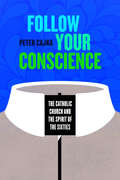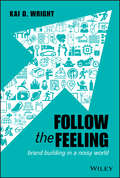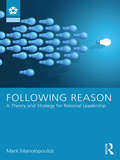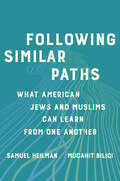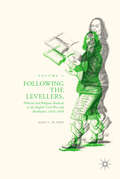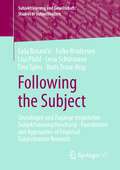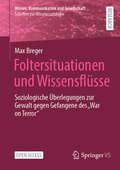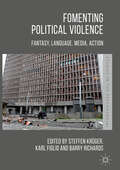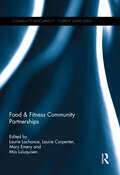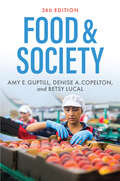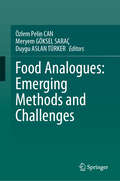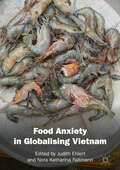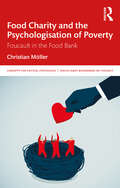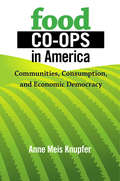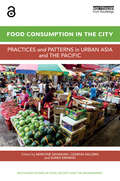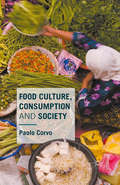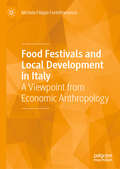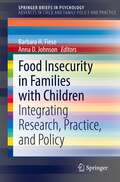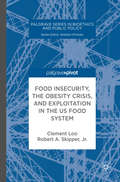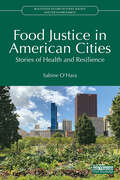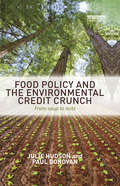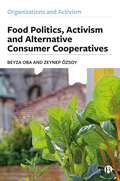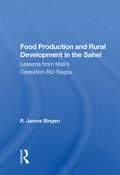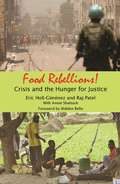- Table View
- List View
Follow Your Conscience: The Catholic Church and the Spirit of the Sixties
by Peter CajkaWhat is your conscience? Is it, as Peter Cajka asks in this provocative book, “A small, still voice? A cricket perched on your shoulder? An angel and devil who compete for your attention?” Going back at least to the thirteenth century, Catholics viewed their personal conscience as a powerful and meaningful guide to align their conduct with worldly laws. But, as Cajka shows in Follow Your Conscience, during the national cultural tumult of the 1960s, the divide between the demands of conscience and the demands of the law, society, and even the church itself grew increasingly perilous. As growing numbers of Catholics started to consider formerly stout institutions to be morally hollow—especially in light of the Vietnam War and the church’s refusal to sanction birth control—they increasingly turned to their own consciences as guides for action and belief. This abandonment of higher authority had radical effects on American society, influencing not only the broader world of Christianity, but also such disparate arenas as government, law, health care, and the very vocabulary of American culture. As this book astutely reveals, today’s debates over political power, religious freedom, gay rights, and more are all deeply infused by the language and concepts outlined by these pioneers of personal conscience.
Follow the Feeling: Brand Building in a Noisy World
by Kai D. WrightElevate your brand, rise above the crowd, and build tribe In Follow the Feeling, strategy advisor Kai D. Wright answers a critical question plaguing entrepreneurs, brand strategists, marketers, and leaders: how do you grow your brand in a noisy world? Analyzing 1,500 fast-growing companies from Alibaba to Zara, the Columbia University lecturer and Ogilvy global consulting partner unpacks five branding secrets. Starting with behavioral economic principles and ending with a new systems-based approach to brand building, Wright offers readers one metric that trumps the hundreds entangling brand value, feelings. Follow the Feeling will show you how to best build and position your brand so you can stand out from competitors, build a tribe, and engineer a positive feeling across five important branding territories—lexicon, audio cues, visual stimuli, experience, and culture. Sharing real-world lessons and practical advice he has gained helping everyone from Sean Diddy Combs and Meghan Trainor to Bank of America and HP develop and implement shareable, culturally-infectious branding strategies. Through storytelling, global research, and practical tips, this valuable book will help you and your organization: Efficiently create and deploy a comprehensive brand strategy across the organization Quickly launch new brands or reboot existing brands for growth Build tribes from audiences, consumers, clients, and partners Lean into the convergence of communication, culture, digital, and technology Regardless of industry or sector, branding is essential for companies, non-profits, and even individuals. Follow the Feeling: Brand Building in a Noisy World is a must-have resource for anyone from C-Suite executives to aspiring entrepreneurs seeking to unleash the full potential of their brand. And in this world of ever-increasing metrics paired with waning attentiveness, the most important signal of brand health is how you, through your brand, make people feel.
Following Reason: A Theory and Strategy for Rational Leadership (Leadership: Research and Practice)
by Mark ManolopoulosThroughout history, humanity has regularly followed anti-rational figures and forces: demagogic rulers, perverted deities, exploitative economic systems, and so on. Such leadership and followership have wrought all kinds of oppression and conflict. What if this pattern could be altered? What if society were led by Reason instead? Prompted by Cicero’s exhortation to "follow reason as leader as though it were a god", Following Reason: A Theory and Strategy for Rational Leadership explores this intriguing and potentially transformative possibility. Manolopoulos uniquely blends leadership psychology with a deep understanding of philosophical reasoning theory to show how leaders can bravely reimagine and reconstruct society. The book retraces leadership mis-steps in history, and proposes a more "logicentric" theory of leadership, built on compelling philosophical axioms and arguments. Following Reason emphasizes the weight of philosophy and cognition in leadership, and advocates for a diverse network that can create, uphold, and implement a blueprint for a better global society. This wide-ranging and timely book is ideal for leadership, management, and philosophy students at undergraduate and graduate levels.
Following Similar Paths: What American Jews and Muslims Can Learn from One Another
by Samuel C. Heilman Mucahit BiliciTwo academics, one Jewish and one Muslim, come together to show how much their faiths have in common—particularly in America. This book provides a braided portrait of two American groups whose strong religious attachments and powerful commitments to ritual observance are not always easy to adapt to American culture. Orthodox Jews and observant Muslims share many similarities in their efforts to be at home in America while holding on to their practices and beliefs. As Samuel Heilman and Mucahit Bilici reveal, they follow similar paths in their American experience. Heilman and Bilici immerse readers in three layers of discussion for each religious group: historical evolution, sociological transformation, and a comparative understanding of certain parallel beliefs and practices, each of which is used as a window onto the lived reality of these communities. Written by two sociologists, one a religiously observant American Jew and the other an American Muslim, Following Similar Paths offers lively insider and outsider perspectives that deepen our understanding of American diversity and what it means to be religious in a modern society.
Following the Levellers, Volume One: Political and Religious Radicals in the English Civil War and Revolution, 1645–1649
by Gary S. De KreyThis book reinterprets the Leveller authorships of John Lilburne, Richard Overton and William Walwyn, and foregrounds the role of ordinary people in petitioning and protest during an era of civil war and revolution. The Levellers sought to restructure the state in 1647-49 around popular consent and liberty for conscience, especially in their Agreement of the People. Their following was not a ‘movement’ but largely a political response of the sects that had emerged in London’s rapidly growing peripheral neighbourhoods and in other localities in the 1640s. This study argues that the Levellers did not emerge as a separate political faction before October 1647, that they did not succeed in establishing extensive political organisation, and that the troop revolt of spring 1649 was not really a Leveller phenomenon. Addressing the contested interpretations of the Levellers throughout, this book also introduces Leveller history to non-specialist readers.
Following the Subject: Grundlagen und Zugänge empirischer Subjektivierungsforschung - Foundations and Approaches of Empirical Subjectivation Research (Subjektivierung und Gesellschaft/Studies in Subjectivation)
by Tina Spies Saša Bosančić Boris Traue Folke Brodersen Lisa Pfahl Lena SchürmannDie Subjektivierungsanalyse verbindet gesellschafts- und sozialtheoretische Reflektionen moderner Selbst- und Weltverhältnisse mit empirischen Analysen zur Wechselwirkung von Subjekten und ihren Subjektivierungsinstanzen. Im Zentrum steht die Frage, wie die von der Gesellschaft hervorgebrachten Subjekte auf das gegenwärtige Subjektivierungsgeschehen einwirken und es bestimmen (können). Der Band führt in theoretische Grundlagen ein, stellt methodische Ansätze vor und diskutiert Potentiale empirisch begründeter Theoriebildung zur Subjektivierung in Gegenwartsgesellschaften. Subjectivation research explores the relationship amongst social theory, reflections of the modern self, and empirical analyses of subject formations. Drawing on these empirical analyses of interactions between subjects and instances of subjectivation, this volume highlights how subjects can ‘talk back’. Readers are introduced to theoretical foundations, methodological approaches as well as empirically based theories on subjectivation in contemporary societies.
Foltersituationen und Wissensflüsse: Soziologische Überlegungen zur Gewalt gegen Gefangene des „War on Terror“ (Wissen, Kommunikation und Gesellschaft)
by Max BregerIn diesem Open-Access-Buch geht Max Breger Fragen zu Folter aus Perspektive der interaktionistischen Soziologie nach. Folter ist eine extreme Form zwischenmenschlichen Handelns, die als Menschenrechtsverletzung zwar delegitimiert, aber übliche Praxis moderner Staaten ist. Dabei nutzen Folternde die vielfältigen leiblich-psychischen Verletzlichkeiten des Menschen, um als ‚feindlich‘ verstandene Andere in Leiden zu versetzen und Übermacht auszuüben. Doch wie lassen sich Foltersituationen als soziale Situationen darüber hinaus fassen? Welche Verflechtungen von Wissen über 'effektive' Foltertechniken, Feindkonstruktionen und Rechtsnormen wie dem globalen Folterverbot sind dabei relevant? Als empirischer Fall dient der US-Folterkomplex während des sogenannten War on Terror, der infolge der Terroranschläge des 11. September 2001 als gezielte Politik der US-Regierung von dem Geheimdienst CIA und Teilen des US-Militärs außerhalb rechtsstaatlicher Normen etabliert wurde. Anhand von organisationalen Dokumenten wie Memoranden und Verhörplänen sowie Zeugnissen von Folterüberlebenden und ehemaligem Personal an Folterorten wie Guantánamo untersucht Max Breger Foltersituationen in ihren historischen und organisationalen Kontexten. Mit seiner wissens-, körper- und gewaltsoziologischen Analyse trägt er zum Verständnis von Legitimierung und Ausübung staatlicher Gewalt bei.
Fomenting Political Violence: Fantasy, Language, Media, Action (Studies in the Psychosocial)
by Karl Figlio Barry Richards Steffen KrügerThis book offers a psychosocial perspective on political violence, employing a strong current of psychoanalytic thinking. In the course of its chapters an international roster of researchers and scholars offers a richly complex and insightful view of diverse forms of political violence and its build-ups. The authors discuss the processes by which the ground for political violence is prepared, and how violent acts are facilitated. They question how social, cultural and political constellations can develop in such a way that, for certain people in this constellation, violence becomes a logical – perversely reasonable – response. This collection demonstrates what a psychoanalytic perspective can bring to existing approaches to political violence, going beyond the social movement approach by unfolding the inherent ambiguity in accepted concepts within the study of political violence.
Food & Fitness Community Partnerships (Community Development – Current Issues Series)
by Laurie Lachance, Laurie Carpenter, Mary Emery and Mia LuluquisenThis book describes many of the unique contributions of the Food & Fitness program including a number of early successes, drawing lessons from efforts to form and maintain partnerships, and from the strategies employed to create structural change in communities. This important study introduces the Food and Fitness community partnerships and their work to increase access to healthy, locally grown food, and opportunities for physical activity, in vulnerable communities across the United States. Established in 2007 and funded by the WK Kellogg Foundation, the partnerships are increasing the capacity of communities to participate in policy and systems change to positively affect their health and well-being. The material covered in the chapters provide an illustration of how funders, grantees, and partners can work together to create sustainable change at the neighborhood level to ensure that all children and families are able to thrive. A range of studies ae looked at from the various initiatives funded nationwide to evaluation methods and results, and an explanation of the role of philanthropy in community development from the viewpoint of the funders. This book was originally published as a special issue of Community Development.
Food & Society: Principles and Paradoxes
by Amy E. Guptill Denise A. Copelton Betsy LucalThis popular text, now in a third edition, offers readers a vivid perspective on the cultural and social complexities of food practices and the current food system. Synthesizing insights from the multidisciplinary field of food studies, this book engages readers&’ curiosity by highlighting the seeming paradoxes of food: how food is both individual and social, reveals both distinction and conformity, and, in the contemporary era, seems to come from everywhere but nowhere in particular. Each chapter begins with an intriguing case study and ends with suggested resources and activities. Chapter topics include identity, restaurants and food media, health, marketing, industrialization, global food, surplus and scarcity, and social change. Updates and enhancements in this edition reflect new scholarly insights into how food is involved in social media, social movements, and the COVID-19 pandemic. Throughout, the book blends concepts and empirical accounts to address the central issues of culture, structure, and social inequality. Written in a lively, accessible style, this book provides students with an unrivalled and multifaceted introduction to this fascinating aspect of social life.
Food Analogues: Emerging Methods and Challenges
by Özlem Pelin Can Meryem Göksel Saraç Duygu Aslan TürkerAs vegetarian and vegan diets have taken hold across the Western world in recent years, the food industry has in turn seen a burgeoning demand for plant-based substitutes, known as analogues. Consumers are hungry for a product that aligns with their values, meets their nutritional needs, and also delivers on its promise of simulating the qualities of its target food item, be that beef, chicken, egg or dairy. Researchers are thus continually working to more closely approximate not only the taste but also the aesthetic, textural and rheological properties of the food item they are imitating. Meanwhile, questions about the nutritional content and environmental impact of food analogues are also of major interest for conscious consumers. While existing volumes have covered specific analogues such as meat or dairy, Food Analogues: Emerging Methods and Challenges will be the first to offer an authoritative overview of all food analogues and comprehensively assess the current and future state of the industry. This text covers both the fundamental processes of textural manipulation and sensory evaluation as well as the microbiological and regulatory aspects of these plant-based substitutes. Looking towards the future of food analogue technology, it will also discuss promising new approaches such as the use of 3D printing and edible insects in analogue production. This book will be of value to researchers, manufacturers, regulators, nutritionists, and even consumers themselves, seeking to make more informed decisions about their diets.
Food Anxiety in Globalising Vietnam
by Judith Ehlert Nora Katharina FaltmannThis open access book approaches the anxieties inherent in food consumption and production in Vietnam. The country’s rapid and recent economic integration into global agro-food systems and consumer markets spurred a new quality of food safety concerns, health issues and distrust in food distribution networks that have become increasingly obscured. This edited volume further puts the eating body centre stage by following how gendered body norms, food taboos, power structures and social differentiation shape people’s ambivalent relations with food. It uncovers Vietnam’s trajectories of agricultural modernisation against which consumers and producers manoeuvre amongst food self-sufficiency, security and abundance.Food Anxiety in Globalising Vietnam is explicitly about ‘dangerous’ food – regarding its materiality and meaning. It provides social science perspectives on anxieties related to food and surrounding discourses that travel between the local and the global, the individual and society and into the body. Therefore, the book’s lens of food anxiety matters for social theory and for understanding the embeddedness and discontinuities of food globalizations in Vietnam and beyond. Due to its rich empirical base, methodological approaches and thematic foci, it will appeal to scholars, practitioners and students alike.
Food Charity and the Psychologisation of Poverty: Foucault in the Food Bank (Concepts for Critical Psychology)
by Christian MöllerThis book offers a unique discursive perspective on the rapid rise of food charity and how food poverty has emerged as a symptom of deeper problems requiring psychological intervention. Christian Möller explores how new anti-poverty programmes and advice cultures are psychologising poverty by locating causes and solutions inside the mind rather than in the outside world, and considers the political stakes in citizens becoming subjects of charity. Drawing extensively on Foucault alongside feminist and critical theory, the book puts forward an overdue challenge to the pervasive effects of a psychology, which limits our thinking about poverty with promises of development, happiness and resilience, but leaves social inequalities intact. Möller argues for returning critical psychology to praxis to address social injustices and inequalities. Challenging common assumptions about food charity as a symptom of a retreating welfare state, he shows how power is exercised and knowledge is produced in these spaces of care and community. Also featuring direct applications of concepts to the real-world example of food banks, the book helps set out practical guidance for students and researchers designing empirical projects in critical psychology. Drawing on original research and interviews with managers and volunteers, this text is fascinating reading for students and academics interested in critical psychology, and the relationship between charity, poverty and social exclusion.
Food Co-ops In America
by Anne Meis KnupferIn recent years, American shoppers have become more conscious of their food choices and have increasingly turned to CSAs, farmers' markets, organic foods in supermarkets, and to joining and forming new food co-ops. In fact, food co-ops have been a viable food source, as well as a means of collective and democratic ownership, for nearly 180 years. In Food Co-ops in America, Anne Meis Knupfer examines the economic and democratic ideals of food cooperatives. She shows readers what the histories of food co-ops can tell us about our rights as consumers, how we can practice democracy and community, and how we might do business differently. In the first history of food co-ops in the United States, Knupfer draws on newsletters, correspondence, newspaper coverage, and board meeting minutes, as well as visits to food co-ops around the country, where she listened to managers, board members, workers, and members. What possibilities for change—be they economic, political, environmental or social—might food co-ops offer to their members, communities, and the globalized world? Food co-ops have long advocated for consumer legislation, accurate product labeling, and environmental protection. Food co-ops have many constituents—members, workers, board members, local and even global producers—making the process of collective decision-making complex and often difficult. Even so, food co-ops offer us a viable alternative to corporate capitalism. In recent years, committed co-ops have expanded their social vision to improve access to healthy food for all by helping to establish food co-ops in poorer communities.
Food Consumption in the City: Practices and patterns in urban Asia and the Pacific (Routledge Studies in Food, Society and the Environment)
by Suren Erkman Marlyne Sahakian Czarina SalomaFood consumption patterns and practices are rapidly changing in Asia and the Pacific, and nowhere are these changes more striking than in urban areas. This book brings together scholars from anthropology, sociology, environmental studies, tourism, architecture and development studies to provide a comprehensive examination of food consumption trends in the cities of Asia and the Pacific, including household food consumption, eating out and food waste. The chapters cover different scales of analysis, from household research to national data, and combine different methodologies and approaches, from quantifiable data that show how much people consume to qualitative findings that reveal how and why consumption takes place in urban settings. Detailed case studies are included from China, India, Japan, Malaysia, Philippines, South Korea and Vietnam, as well as Hawai'i and Australia. The book makes a timely contribution to current debates on the challenges and opportunities for socially just and environmentally sound food consumption in urbanizing Asia and the Pacific.
Food Consumption in the City: Practices and patterns in urban Asia and the Pacific (Routledge Studies in Food, Society and the Environment)
by Suren Erkman Marlyne Sahakian Czarina SalomaFood consumption patterns and practices are rapidly changing in Asia and the Pacific, and nowhere are these changes more striking than in urban areas. This book brings together scholars from anthropology, sociology, environmental studies, tourism, architecture and development studies to provide a comprehensive examination of food consumption trends in the cities of Asia and the Pacific, including household food consumption, eating out and food waste.The chapters cover different scales of analysis, from household research to national data, and combine different methodologies and approaches, from quantifiable data that show how much people consume to qualitative findings that reveal how and why consumption takes place in urban settings. Detailed case studies are included from China, India, Japan, Malaysia, Philippines, South Korea and Vietnam, as well as Hawai'i and Australia. The book makes a timely contribution to current debates on the challenges and opportunities for socially just and environmentally sound food consumption in urbanizing Asia and the Pacific.Chapter 3 of this book is freely available as a downloadable Open Access PDF at http://www.taylorfrancis.com under a Creative Commons Attribution-Non Commercial-No Derivatives (CC-BY-NC-ND) 3.0 license.
Food Culture, Consumption and Society
by Paolo CorvoThis book analyses how consumer food choices have undergone profound changes in the context of the economic crisis, including the rediscovery of local products and the diffusion of multi-ethnic food. Corvo argues that a new ecological relationship between food and the environment is needed to reduce food problems such as food waste and obesity.
Food Festivals and Local Development in Italy: A Viewpoint from Economic Anthropology
by Michele Filippo FontefrancescoWhat does the proliferation of food festival tell us about rural areas? How can these celebrations pave the way to a better future for the local communities? This book is addressing these questions contributing to the ongoing debate about the future of rural peripheries in Europe.The volume is based on the ethnographic research conducted in Italy, a country internationally known for its food tradition and one of the European countries where the gap between rural and urban space is most pronounced. It offers an anthropological analysis of food festivals, exploring the transformational role they have to change and develop rural communities. Although the festivals aim mostly at tourism, they contribute in a wider way to the life of the rural communities, acting as devices through which a community redefines itself, reinforces its sociality, reshapes the perception and use of the surrounding environment. In so doing, thus, the books suggests to read the festivals not just as celebrations driven by food fashion, but rather fundamental grassroots instruments to contrast the effects of rural marginalization and pave the way to a possible better future for the community
Food Insecurity in Families with Children: Integrating Research, Practice, and Policy (SpringerBriefs in Psychology)
by Barbara H. Fiese Anna D. JohnsonThis book synthesizes research about the effects of food insecurity on children, families, and households, emphasizing multiple pathways and variations across developmental contexts. It focuses on emerging new methods that allow for a more refined approach to practice and policy. The volume provides a brief overview of the topic, and additional empirical chapters pose and address unanswered research questions. It concludes with a short commentary, providing recommendations for future research and policy and yielding a significant and timely contribution to advance developmental scientific knowledge and promote its use to improve the lives of children and families. Featured areas of coverage include: The effects of early food insecurity on children’s academic and socio-emotional outcomes.The effects of household food insecurity on children with disabilities.Early childhood access to Women, Infants, and. Children (WIC) and school readiness.Supplemental Nutrition Assistance Program (SNAP) and adolescent mental health. Food Insecurity in Families with Children is an essential resource for policy makers and related professionals as well as graduate students and researchers in developmental, clinical, and school psychology, child, youth and family policy, public health, and social work.
Food Insecurity, the Obesity Crisis, and Exploitation in the US Food System
by Clement Loo Robert A. Skipper Jr.This book argues that the factors contributing to obesity as a product of food insecurity have risen largely from the exploitation of vulnerable communities. In the past, food insecurity has been understood as primarily a matter of famine, hunger, and undernutrition. Such an understanding is no longer accurate: food insecurity is now also associated with obesity, the rates of which have increased dramatically in the past thirty years, particularly among lower-income communities and communities of color. This is likely the result of changes in the food system, including the reduction of access to fresh produce. Governments and intergovernmental bodies are therefore justified in more vigorously and directly intervening in the food system to ensure that communities have access to foods that contribute to better public health outcomes.
Food Justice in American Cities: Stories of Health and Resilience (Routledge Studies in Food, Society and the Environment)
by Sabine O’HaraThis book documents food insecurity in urban communities across the United States and asks whether emerging urban food and agriculture initiatives can address the food security needs of American city dwellers. While America has sufficient food to feed its entire population, 38 million people are food insecure, with urban communities and communities of color having long borne the brunt of food inequalities. This book traces the evolving story of food by describing the people behind food system statistics, focusing on cities and suburban communities across America. In doing so, it raises questions not only about food security but about a food economy that can foster justice and sustainability and combat hunger and waste. By linking human faces to the data, the book reveals the many connections between food insecurity and unsustainable practices. The book concludes by discussing some of the pathways toward a more sustainable and just food system by linking the food system to the larger economy and the many sectors that are connected to food. Because of these multifaceted connections, food can be a unique catalyst for creating pathways toward a more just and sustainable economy that is more aligned with nature. This book will be of great interest to students and scholars of food justice, food security, urban food and agriculture, urban sustainability, and sustainable food systems more broadly.
Food Policy and the Environmental Credit Crunch: From Soup to Nuts
by Paul Donovan Julie HudsonThe changing economic environment for the consumer that is emerging from the wreckage of the financial credit crunch plays directly into the importance of food spending. This is certainly true from the perspective of food prices in the short run, but also from the perspective of sustainability and reducing the impact of the environmental credit crunch. The economic changes we experience now have a bearing on our ability to manage the environmental credit crunch that looms. Food Policy and the Environmental Credit Crunch: From Soup to Nuts elaborates on the issues addressed in the authors’ first book, From Red to Green?,and asks whether the financial credit crunch could ameliorate or exacerbate the emergent environmental credit crunch. The conclusion drawn here is that a significant and positive difference could be made by changing some of the ways in which we procure, prepare, and consume our food. Written by an economist and an investment professional, this book addresses the economic and environmental implications of how we treat food. The book examines each aspect of the ‘food chain’, from agriculture, to production and processing, retail, preparation, consumption and waste.
Food Politics, Activism and Alternative Consumer Cooperatives
by Zeynep Özsoy Beyza ObaFollowing the global financial crisis of 2008, there has been significant interest among scholars and activists in alternative forms of organization that operate according to noncapitalist logic, including Alternative Consumer Cooperatives (ACCs). Using the example of Turkey, where neoliberal economics combined with authoritarian politics formed conditions that have profound social and economic consequences, this book investigates ACCs as spaces for prefigurative food politics. Offering a novel perspective on alternative forms of organizing, this book challenges the easy assumptions of what it means to be a scholar working on activism in the global north and shows how, through the foundational values of solidarity, reciprocity and responsibility, it is possible to create new and imaginative forms of politics and activism.
Food Production And Rural Development In The Sahel: Lessons From Mali's Operation Riz-segou
by R. James BingenIn Mali and throughout the Sahel, governments increasingly rely on parastatal organizations to overcome the problems of lagging food production and rural poverty. This book examines the political and economic consequences of the efforts of one organization, Operation Riz-Segou in Mali, to increase smallholder food and cash crop production. Drawing extensively on fieldwork in Mali, the author finds that significant investments in irrigation facilities, financed by foreign aid, have not reduced the smallholder's vulnerability to the risks posed by weather and uncertain flood levels of the Niger River. The extension system discourages smallholder investment for long-term agricultural development because of its preoccupation with supervision and administrative control. Moreover, the Operation engages in many popular rural development activities—literacy programs, farmer training, women's artisanal centers—that give the facade of grassroots participation but in reality do not provide villagers a critically needed voice in local program administration. Comparing Operation Riz-Segou to similar parastatal agricultural development programs in the Sahel, Dr. Bingen discusses why only those policies deliberately designed and carefully implemented to share power with the majority of the people can lay the political and economic foundation required to overcome rural poverty and resolve the food crisis in the Sahel.
Food Rebellions
by Raj Patel Eric Holt-GimenezToday there are over a billion hungry people on the planet, more than ever before in history. While the global food crisis dropped out of the news in 2008, it returned in 2011 (and is threatening us again in 2012) and remains a painful reality for the world's poor and underserved. Why, in a time of record harvests, are a record number of people going hungry? And why are a handful of corporations making record profits? In Food Rebellions! Crisis and the Hunger for Justice, authors Eric Holt-Giménez and Raj Patel with Annie Shattuck offer us the real story behind the global food crisis and document the growing trend of grassroots solutions to hunger spreading around the world.Food Rebellions! contains up to date information about the current political and economic realities of our food systems. Anchored in political economy and an historical perspective, it is a valuable academic resource for understanding the root causes of hunger, growing inequality, the industrial agri-foods complex, and political unrest. Using a multidisciplinary approach, Holt-Giménez and Patel give a detailed historical analysis of the events that led to the global food crisis and document the grassroots initiatives of social movements working to forge food sovereignty around the world. These social movements and this inspiring book compel readers to confront the crucial question: Who is hungry, why, and what can we do about it?
